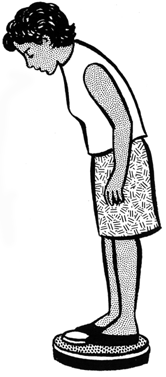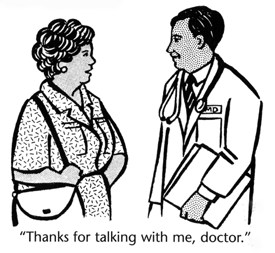Helping Yourself During Chemotherapy: Summary
Step 1
Step 2
Step 3
Step 4
Helping Yourself During Chemotherapy: Summary

Helping Yourself During Chemotherapy
4 Steps for Patients
National Institutes of Health
| National Cancer Institute
Chemotherapy is treating cancer with drugs that kill cancer cells.
What you do during chemotherapy is important to your health. This
information talks about ways to help yourself:
-
Feel better
-
Solve problems that come up
-
Work with your doctor to get well
If you have any questions after reading this, ask your doctor or nurse. They
can tell you more about chemotherapy.
Click on one of the steps to learn more.....
| STEP
1 1 |
Tell your doctor if you get side effects from treatment |
| STEP
2 2 |
Ask your doctor before you take any other medicine |
| STEP
3 3 |
Take care of your health |
| STEP
4 4 |
Talk about your feelings |
Talk to your doctor and nurse about these four steps. Ask questions about
the information that you are about to read. Be sure to know how to do your
part in helping chemotherapy work for you.
To learn more about cancer, call the National Cancer Institute's Cancer
Information Service at 1-800-4-CANCER (1-800-422-6237). The people who answer
your call will talk with you about chemotherapy or any other cancer questions
you have.
Step 1
Tell the doctor if you have any of these problems:

|
- Nosebleeds
- Feeling tired
- Constipation
- Sores in your mouth or throat
- Coughing a lot
- Feeling tingling in your fingers and toes
- Ringing in your ears
- Red dots under your skin

- Black and blue marks
- Feeling sick to your stomach or throwing up
- Loose or runny bowel movements
- A fever of 101 degrees of higher

- Losing your hair
- Losing or gaining 10 pounds or more
|
Questions? Ask your doctor or nurse.
Step 2
Chemotherapy uses drugs to fight your cancer.
Taking other medicine during treatment can cause problems.
To get the best results:

Ask Your Doctor or Nurse |
- Tell your doctor about all other medicines you
take, even if they're for birth control.
- Tell your doctor about medicines another doctor gave
you or that you bought at the store.
- Don't take aspirin unless your doctor says it's O.K.
Aspirin is in a lot of drugs. Ask the pharmacist if there's aspirin in
any drug you're thinking about buying.

Don't take any medication unless your doctor says it's okay. |
Step 3
Eat Right
- Keep your weight about the same
- Drink lots of liquids
- If your stomach is not upset, eat foods like these each
day:

Take good care of your mouth, even if it is sore
- Try to brush your teeth after every meal.
- Use a soft toothbrush and regular flavored toothpaste
- If you can't brush, rinse your mouth with water.

Stay away from people who have colds or the flu
Their germs could make you sick
Have all the blood tests your doctor orders
Blood tests help your doctor watch your health
Step 4

Being treated for cancer can change the way you feel about
things. It can make you feel sad or mad or scared. That's normal. But it
can help to talk about it.
Some people talk to their friends or family. Some talk
to others who have had cancer or to a counselor. Your nurse or social worker
can tell you more.
Many people also have questions about sex and birth control.
Talk to your doctor or nurse about your choices.
|